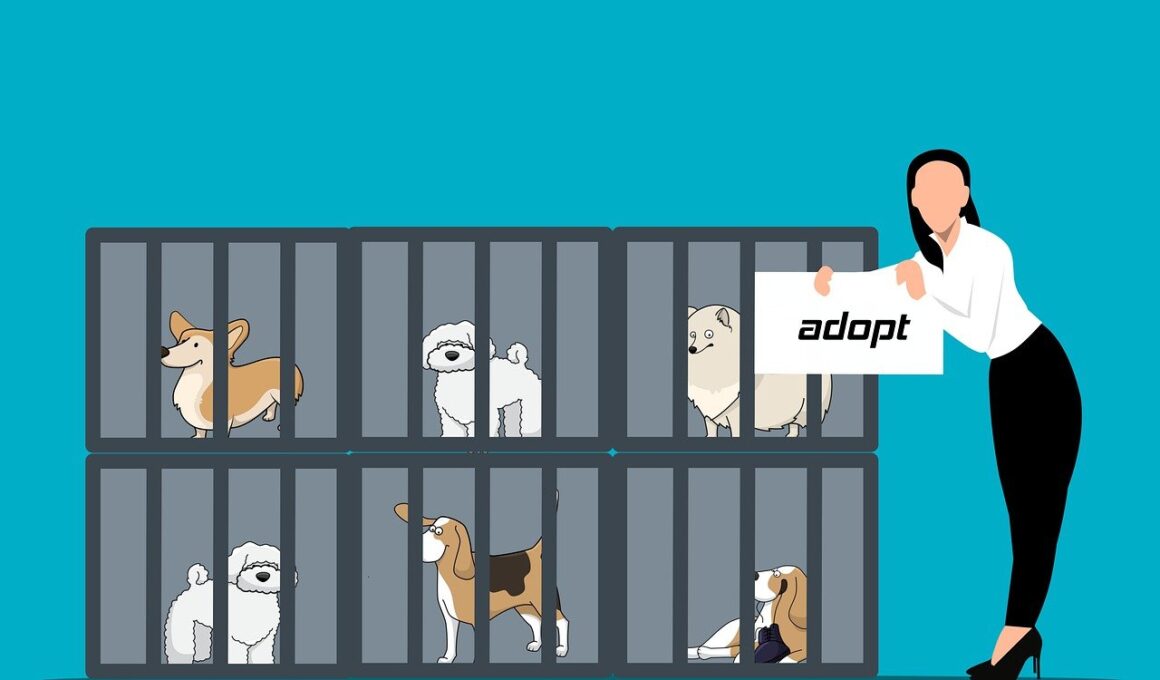Diagnosing and Treating Infections in Adopted Dogs
When adopting dogs, potential owners should be aware of common health issues, particularly infections. Understanding the signs and symptoms is crucial for early diagnosis and effective treatment. While some infections may arise post-adoption, others may be pre-existing conditions that require immediate attention. Observing your adopted dog’s behavior closely can help identify potential health problems. Common signs include lethargy, loss of appetite, and unusual discharge. Providing a safe and clean environment for your new pet increases their chances of avoiding infections. Make sure to research potential health risks associated with specific breeds. If you’re unsure, consult a veterinarian for tailored advice. Regular check-ups and vaccinations can significantly reduce the risk of infection in adopted dogs. Ensure the dog’s vaccinations are up to date, as this contributes to their overall health and vitality. Moreover, educating yourself about parasites such as fleas and ticks is essential since they can lead to serious infections. Careful monitoring and preventive care are fundamental in keeping your adopted dog happy and healthy. Tasks like grooming and regular baths can also help in maintaining hygiene and preventing infections.
An important aspect of dog ownership involves being vigilant about any changes in your adopted dog’s health. Keep in mind that certain breeds may be more susceptible to infections than others. Common infections include ear infections, skin infections, and urinary tract infections. Each type of infection has different symptoms that owners should be knowledgeable about. For example, if your pet is frequently scratching their ears or shaking their head, it could indicate an ear infection. Skin infections might present as redness, swelling, or pus-filled bumps. In addition, watch for urinary issues such as frequent urination or straining to urinate, indicating a potential infection. If you suspect any of these issues, don’t hesitate to contact a veterinarian immediately. Most infections are treatable if diagnosed early. Besides regular vet visits, maintaining a healthy diet is important and can strengthen your dog’s immune system. Discuss nutrition options with your vet to ensure you’re choosing the best food for your pet’s specific health needs. Remember, prevention is better than cure; therefore, staying informed about the health of your adopted dog fosters their ongoing well-being.
Preventative Care for Infections
Providing preventative care is the first line of defense against health issues in adopted dogs. One of the most effective preventive measures is ensuring your dog receives timely vaccinations. Vaccines protect against various infectious diseases and help strengthen their immune response. Moreover, flea and tick prevention is equally important in avoiding infections associated with these parasites. A variety of options, such as topical treatments and oral medications, are available. Consult your vet to determine the best protection for your dog. Regular grooming is another excellent method for preventing infections, particularly skin issues. Brushing removes dirt and loose hair, which aids in reducing skin irritations. Bathing your dog with appropriate shampoos can also help keep their skin and coat healthy. Additionally, maintaining proper dental hygiene can prevent infections that lead to more severe health problems. Consider introducing dental chews or toothbrushes specifically designed for dogs. Furthermore, make sure your dog is consuming a balanced diet rich in vitamins and minerals. A strong immune system helps fend off infections, so focus on quality nutrition tailored to your dog’s needs. Overall, a proactive approach will promote your adopted dog’s health.
If your adopted dog exhibits symptoms of an infection, prompt action is essential for their recovery. Schedule an appointment with a veterinary professional for a thorough examination. Your vet will likely perform diagnostic tests to identify the infection and prescribe appropriate treatment. This treatment can involve antibiotics, antifungals, or medication for specific parasites. Timeliness contributes significantly to the success of the treatment. Following the vet’s recommendations accurately is crucial to ensure complete healing. In some cases, follow-up appointments may be necessary to monitor progress. Additionally, provide a comfortable environment for your dog while they are recovering. A quiet space conducive to rest is vital for their healing process. Pay attention to their comfort level and provide any medication as prescribed. Make sure to keep an eye on their eating and drinking habits, as these can be indicators of recovery. Moreover, avoid exposing them to other animals until they are cleared by a veterinarian. Careful monitoring during recovery allows you to catch any concerning signs early. Your vigilance during this time strengthens the bond between you and your adopted pet, ensuring they feel loved and secure.
Long-term Health Considerations
Being a responsible pet owner means not only focusing on treating infections but also thinking ahead for your adopted dog’s long-term health. Regular health check-ups should be built into your budget and schedule as they provide opportunities for early detection of potential health issues. Engaging with your veterinarian regularly contributes to a well-rounded understanding of your dog’s health status. Additionally, staying informed about breed-specific health concerns can guide care decisions that align with your pet’s needs. If a particular breed is prone to certain infections, adjust care practices to mitigate risks. Proper exercise is essential for maintaining a healthy weight and preventing obesity, which can exacerbate health issues including infections. Daily physical activity strengthens your dog’s immune system and promotes physiological health. Furthermore, consider enrolling in training courses to encourage mental stimulation alongside physical activity. Mental challenges can prevent anxiety and depression, further enhancing overall health. Lastly, ensuring a well-balanced diet is crucial. Consult your vet for recommendations that suit your dog’s nutritional requirements and lifestyle. Long-term planning will enhance your beloved pet’s quality of life.
Education should be an integral part of transitioning into dog ownership, especially for families adopting dogs. Understanding dog behavior and training can significantly alleviate stress and improve your new pet’s well-being. Resources such as local training classes or online courses can provide excellent guidance. Working closely with your adopted dog fosters a healthy relationship built on trust and understanding. Consistent training not only helps in managing behaviors but also reduces the risk of infections related to stress and anxiety. An anxious dog may engage in activities such as licking excessively, leading to infections. Regular socialization opportunities are vital for building confidence in your dog. Interaction with other dogs and people helps curb fearful behaviors and prevents isolation-related issues. Additionally, research common behavioral issues such as separation anxiety and how they may link to overall health. Being proactive helps in adapting promptly to your adopted dog’s needs. Responsible ownership encompasses fostering not only physical health but also emotional and mental well-being. Overall, creating a positive environment contributes to a harmonious and thriving home for your adopted dog.
Conclusion: Commitment to Care
Owning a dog is a lifelong commitment that extends beyond just meeting daily needs. Adopting a dog brings a responsibility to ensure their health and happiness, which includes being vigilant about infections and overall well-being. A proactive approach is essential; understanding common health issues and recognizing symptoms early can save time, money, and heartache. Regularly visiting your veterinarian is part of maintaining long-term health and catching potential problems before they escalate. Engaging with trusted resources and communities offers invaluable support for new dog owners. Ultimately, by fostering a loving and supportive environment, your adopted dog will thrive and enrich your life in countless ways. Through education and commitment, you empower yourself and improve your furry friend’s quality of life. Nurturing a strong bond with your furry companion allows you to enjoy memorable experiences together. Keep learning about dog care, behaviors, and health issues throughout your dog’s life. Armed with knowledge and compassion, you can navigate any challenges that arise. The rewards of responsible ownership and caring for an adopted dog create a fulfilling partnership filled with joy and companionship.
Additional Resources and Support
For those who are new to dog ownership, many resources offer guidance and support. Books, online forums, and local pet organizations can provide valuable information on dog health, behavior, and training. Consider connecting with local animal shelters or rescue groups as they often host training sessions and seminars. Joining a community of fellow dog owners can help you share experiences and learn from others facing similar challenges. Additionally, many veterinarians provide informational pamphlets or brochures about common health issues that adopted dogs face. Utilizing online courses or webinars can offer more in-depth insights into specific topics related to dog health and care. Keep an eye out for workshops that focus on handling health emergencies or first aid for pets. Your local community might also host events focused on pet wellness, offering everything from free health screenings to information sessions. By seeking out these resources, you will be better equipped to care for your adopted dog. A proactive attitude toward learning about your pet’s needs can help ensure a happy and healthy life for both you and your new furry friend.


